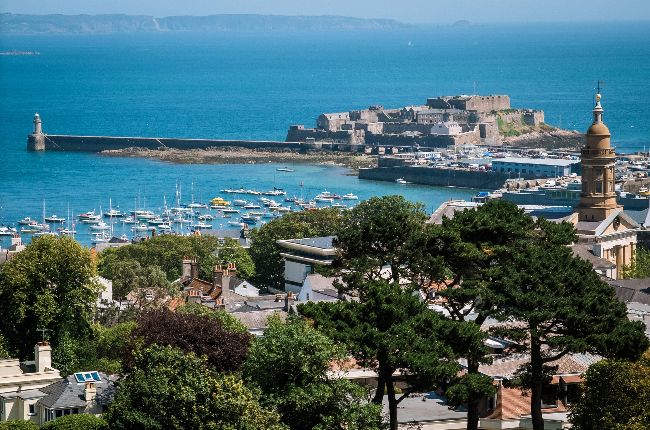A medieval church court
Andrew Stevenson reports on a unique church court in the Channel Islands.
WHEN someone dies his or her financial affairs often have to be put in order by the appointment of executors and the gathering and distribution of the deceased’s estate.
Historically, throughout the British Isles, this process took place under canon law in the courts of the Roman Catholic Church
In Scotland this task was undertaken by bishops, who would delegate their judicial functions to officers known as “commissaries”. At the Reformation this all ceased. Commissary courts were established instead. These were purely secular, and had nothing to do with the Church of Scotland. So the break between ecclesiastical courts and commissary procedure ended here in 1560. As men of learning and reputation, however, ministers were expected to assist the needy in preparing their wills if necessary.
In England the old church court system continued for around another 300 years, after the Church of England assumed the powers of the erstwhile Catholic courts. Otherwise, the system carried on there much as before. The Church of England courts were divested of their probate powers only in 1857. These were transferred to a newly created secular Court of Probate.
The Channel Islands, originally attached to the Duchy of Normandy, are a separate jurisdiction from England, with their own governments, laws and courts. Indeed, they differ amongst each other. But both the Bailiwicks of Jersey and Guernsey maintain separate church and secular courts.
In Jersey the ecclesiastical court retained probate powers until 1949. In Guernsey, however, the equivalent court still has a jurisdiction over such matters. It is probably unique in that respect.
The Ecclesiastical Court of Guernsey dates from mediaeval times. Its nadir was the trial of three Protestant women, the Guernsey Martyrs, who were burnt at the stake for heresy during the reign of Bloody Mary. One of the victims is said to have given birth during the ordeal. These horrific events are reported in Foxe’s Book of Martyrs and they are commemorated by a plaque in the island’s capital, St Peter Port. Reaction to this atrocity is said to have led to the growth of Calvinism in the Channel Islands.
The court now sits on a Friday morning in a room at the Constables’ Office in Lefevbre Street in St Peter Port. The Royal Court is situated elsewhere in the town. I visited the ecclesiastical court to see it in action in August 2019.
The president of the court is the Dean of Guernsey, the Rev Tim Barker, sitting in his capacity as commissary. He kindly showed me how the court operates. As well as dealing with estates the court issues marriage licences. I observed applicants attending and having to swear on a bible (printed in French) that they were entering marriage with no duress, that they had not been previously married to someone still living and that they knew of no impediments to their proposed marriage.
Although it is a courtroom there is little to distinguish the premises from an ordinary office. There were no signs of ecclesiastical authority, emblems, coats of arms or similar adornments on display. There were no court officers present.
The Rev Barker wore a clerical collar, but he did not wear a gown or a wig and his chair and desk were not elevated above the level of those appearing. Unlike, for example, the well preserved 17th century consistory court at Chester Cathedral, this did not feel like a courtroom.
The Ecclesiastical Court of Guernsey is likely to lose the last of its probate powers soon. The government, known as the States of Guernsey, passed an Act in 1994 restricting the court’s jurisdiction to granting probate, where there is a will, or to issuing letters of administration where there is not, in relation to personal property but not land or buildings.
The States now wish to remove probate powers from the Ecclesiastical Court altogether. This was due to happen in January 2019 but logistical problems intervened; the government had yet to organise the staff and facilities to take over from the court.
Money seems to have sealed the court’s fate. At present, fees paid by the court’s users go to the church in Guernsey. It uses the funds to finance the running of the court, maintaining church buildings and for other good causes on the island, such as recently constructing a community centre. Once the secular authorities assume responsibility for probate matters those fees will be payable to the States instead. Whether that is a good thing is debateable; the government in England came very close to imposing massive hikes in probate fees before relenting in October 2019.

Saint Peter Port, Guernsey
The Channel Islands, originally attached to the Duchy of Normandy, are a separate jurisdiction from England, with their own governments, laws and courts.
In addition to financial considerations, there are complaints from atheists and the irreligious; one sees letters in the Guernsey newspapers from citizens spluttering with indignation that they are compelled to engage with the church and to fund its activities.
That the court may be viewed as an anachronism should not be a justification for the reduction of its role. The system appears to work well for court users and for the public good. It is regrettable that this traditional role of the court should be abolished. It does seem inevitable, however.
The development is part of a pattern of inexorable secularisation of the law of succession. By analogy, a Church of Scotland minister was once empowered to act as a notary public in his or her own parish. This was described in a legal textbook from 1928 as “the last vestige of the ancient connection between the Church and the law in Scotland”.
This power was removed by an Act of Parliament only in 1995.
The writer is a practising solicitor and a vice convenor of the Presbyterial Commission of the Church of Scotland.